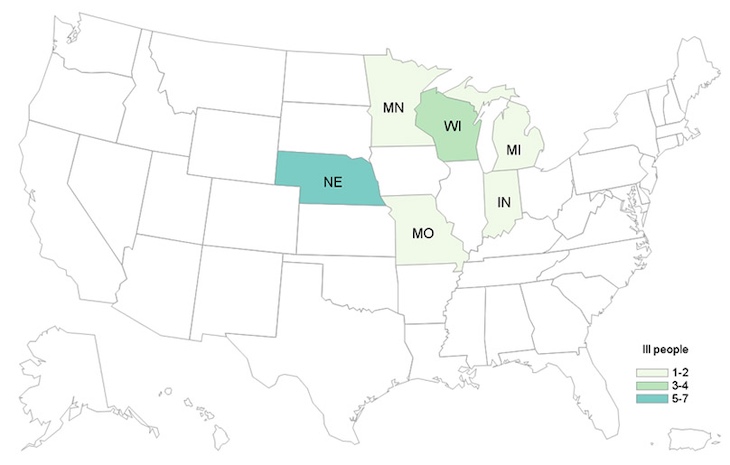The Fresh Thyme blackberries hepatitis A outbreak has now sickened 16 people in 6 states, according to the Centers for Disease Control and Prevention (CDC). Epidemiologic and traceback evidence has found that those sickened in this outbreak ate fresh, conventionally grown blackberries from that store chain.

The patient case count by state is: Indiana (2), Michigan (1), Minnesota (1), Nebraska (7), Wisconsin (4), and Missouri (1). The patient age range is from 14 to 73 years. Illness onset dates ranges from October 8, 2019 to November 15, 2019. Of 15 people who gave information about their health to the government, 9, or 60%, have been hospitalized. That is a very high hospitalization rate for hepatitis A outbreaks.
Of people who were interviewed, 15 out of 15 said they ate fresh blackberries before they got sick. Of 13 people who knew where they bought those blackberries, all said they bought them from Fresh Thyme Farmers Market, which is statistically significant. A survey of healthy people found that only 7% ate fresh blackberries the week before they were interviewed.
The FDA and CDC are collecting records from Fresh Thyme Farmers Market grocery stores to try to find where the blackberries came from. Traceback investigations can take time. The blackberries were on sale at the stores September 9 through September 30, 2019.

Food safety lawyer Fred Pritzker said, “No one should be sick and hospitalized because they bought fresh berries from a grocery store.” You can contact Fred Pritzker for help by calling 1-888-377-8900 or 612-338-0202.
If you purchased blackberries from Fresh Thyme Farmers Market and froze them for later use, discard them. If you aren’t sure where you bought the blackberries in your freezer and they are unlabeled, discard them.
What consumers should do if they bought these berries depends on timing. If you ate blackberries and have been experiencing the symptoms of hepatitis A, see your doctor because you may be part of this Fresh Thyme blackberries hepatitis A outbreak. If you ate blackberries within the last two weeks that were bought at the Fresh Thyme venues and frozen, you can get a hepatitis A or immune globulin vaccination to protect yourself. If you ate blackberries and it’s been more than two weeks, all you can do is watch yourself for the symptoms of hepatitis A. Symptoms usually start 15 to 50 days after exposure to the virus.
Hepatitis A symptoms include jaundice (yellow skin or eyes), lack of appetite, upset stomach, stomach pain, joint pain, fever, vomiting, diarrhea, dark urine, feeling tired, and clay colored stools. Most people recover on their own after this infection, but some people, especially those with liver disease or anyone who has a chronic illness, may get sick enough to be hospitalized, as we see in this outbreak.




